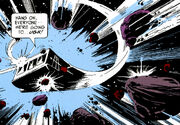
A meteor shower
A meteor shower (also called a meteor storm) is an astronomical phenomenon caused by meteors that poses a hazard to starships.
Meteor showers can affect sensor data, causing scanners to report unusual mineral readings. (TOS novel: Unspoken Truth)
History
65 million years ago, in an alternate timeline, Oya placed a satellite in orbit of Earth. The device annihilated the asteroid which caused the extinction of the dinosaurs, preventing the future evolution of Humans and leaving only an attractive meteor shower. (TOS novel: First Frontier)
In 2262 in the Kelvin timeline, Deep Space Station K-5 was destroyed by a meteor storm. (TOS - Stranger Worlds comic: "Issue 1")
In 2264, a meteor storm severely damaged the transport ship of intergalactic trader Carter Winston, forcing him to crash on Vendor. (TAS episode & Log Two novelization: The Survivor)
Also in the 2260s, magnetically charged meteorites afflicted communications aboard the Enterprise and got past the shields, impacting the starboard warp engine. Kirk chose to drop the Enterprise to the surface of an airless moon so that repairs could be made. While there, a landing party departed in a shuttlecraft to explore Planet 656. (TOS comic: "Ground Zero")
In 2268, the Galileo was hit by a meteor storm, causing it to crash onto a nearby planet. (TOS comic: "Day of the Inquisitors")
In 2293, when USS Excelsior was buffeted by an intense subspace shock wave, Hikaru Sulu doubted it was due to a meteor shower. It had been caused by an explosion on Praxis. (TOS movie & novelization: The Undiscovered Country, VOY episode & novelization: Flashback)
In 2348, William T. Riker observed a dramatic meteor shower over Valdez, Alaska when he was 13 years old. (TTN novel: The Red King)
Prior to 2372, Jake Sisko taught Varis Sul how to safely pilot a spacecraft through meteor showers and ion storms. (DS9 novel: Wrath of the Prophets)
Weaponized uses
In the 2260s, a meteor shower pummeled the hull of the USS Enterprise. The rocks were negatively polarized, having been fired from a cloaked mass driver, and therefore were undetectable to the ship's sensors and automatic deflectors. The ship heaved to for six hours while Montgomery Scott and his engineering crews conducted repairs. James T. Kirk went out in an EV suit with Spock to check on their progress. An out-of-control jet welder wounded him to such a degree that Leonard McCoy sent him back to Earth to recuperate. As a result, Captain Eustace Hensham assumed temporary command of the Enterprise. (TOS comic: "Where Giants Tread")
Also in the 2260s, the Enterprise was pummeled by a storm of meteors made from an unknown element that easily penetrated starship shields and was capable of destroying the ship. The meteors were constructed by Klingons, with the storm to be used as a strategic weapon. (TOS - Which Way Books novel: Phaser Fight)
In the 2260s, the madman Teranius weaponized a meteor storm, firing one at Perinda City on Perinda IV and causing major damage to the city. (TOS audiobook: The Man Who Trained Meteors)
Appendices
Background
- In the real world, a meteor shower can only occur within an atmosphere. In space, technically it would be called a meteoroid storm.
Appendices
Appearances
- TOS - Which Way Books novel: Phaser Fight
- TOS comic: "Day of the Inquisitors"
- TOS comic: "Where Giants Tread"
- TOS comic: "Ground Zero"
- TOS - Stranger Worlds comic: "Issue 1"
- TOS audiobook: The Man Who Trained Meteors
References
- TOS movie & novelization: The Undiscovered Country
- VOY episode & novelization: Flashback
- TAS episode & Log Two novelization: The Survivor
- TOS novel: First Frontier
- TOS novel: Unspoken Truth
- DS9 novel: Wrath of the Prophets
- TTN novel: The Red King
External links
- Meteor shower article at Memory Alpha, the wiki for canon Star Trek.
- Meteor shower article at Wikipedia, the free encyclopedia.
